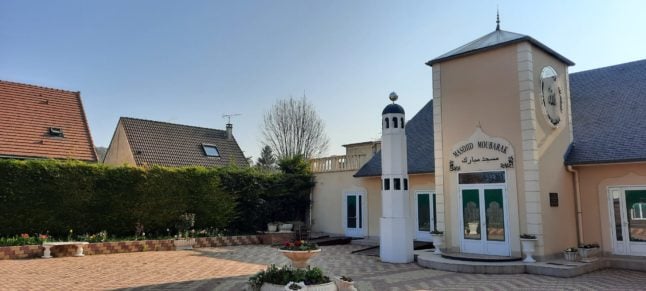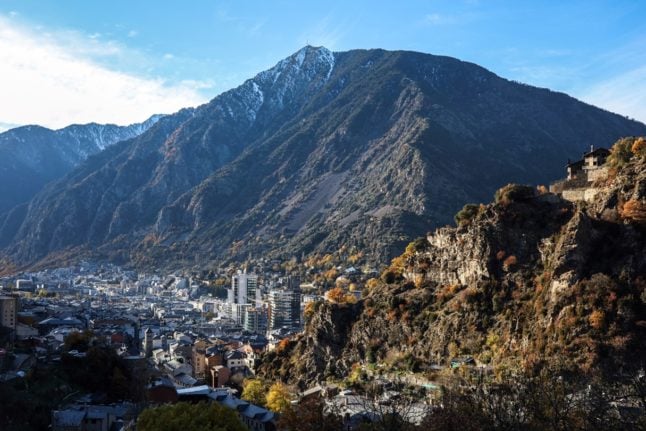“There are millions of French people that are born into or converted to Islam. What are they going to do? Kick them out tomorrow? You cannot go around provoking people like this” said Ashfaq Rabbani, who heads the French Ahmadiyya association, a Muslim group which originated in what today is Pakistan.
“You cannot be the president of 70 million French people if you are going to divide the population further – you cannot only be the president of the majority,” added Talha Rashid, a spokesman for the Ahmadiyya in Saint-Prix.
These are the anxious views heard at the mosque in Saint-Prix, a small village on the edge of the Montmorency Forest, north of Paris. This is the first place of worship built in France by the Ahmadiyya community.
Facing the prospect of a close battle between Emmanuel Macron and his far-right challenger Marine Le Pen in the second round of the French presidential election they are worried, but the increasingly hardline discourse on Islam in France has been a daily source of frustration and anxiety for many years now, especially for the Ahmadiyya, a community that does not believe in rebelling against the authorities.
France’s 2021 ‘anti-separatism’ law and the increasing pressure on Muslim women to abandon the headscarf, even in places where it is now legal, are particular sources of concern.
“You cannot create a society and a morality where women are allowed to walk around in bikinis but they cannot wear a scarf on their head. Individual freedom should be for everyone,” said Rabbani.
Bilal Malik, a member of the community, added: “They say that in years to come, France will be an African France because Islam comes with its own jurisprudence, the Sharia. As Ahmaddis we say the Sharia cannot trump state laws”
In the 2017 election, Saint-Prix’s 7,000 strong population favoured François Fillon, the candidate for the centre-right Les Républicains.
This time, in the first round of voting the commune backed incumbent president Emanuel Macron, promoter of the ‘anti-separatism’ law.
The Ahmadi community prides itself in being apolitical, dealing only with religious issues in the mosque and considering politics a personal choice for their members.
That’s why Rabbani is so bothered about Islam being weaponised by many politicians.
“In 1905, they separated the Church and the State – and we agree”, Rabbani said, referring to the law that established state secularism in France. The community leader added that the opposite must also be true: “We don’t want the state to get involved in our religion”.
READ ALSO Laïcité: What does secularism really mean in France?
The community’s moral code forbids any rebellion against the government, yet governmental decisions can impact how they can profess their own faith in the country.
Rashid points at the mosque built in 2008 and highlights how the architecture combines with the traditional style of the nearby buildings.
“We built it in a way that would not clash with the traditional French style, respecting the neighbours was the most important thing for us”, he said.
The community’s guidelines agree on one statement: it is important to vote, but they will never give guidelines on who to vote for. “The Mosque is not a place for politics”, they said.
Yet, they have made it clear that, to win the vote of the Ahmadis, a politician might need to respect freedom – especially, freedom of religion.
“You really can see a mismatch between the political discourse and the day-to-day reality”, said Leila Belarbi, at the head of the volunteering project for the women’s branch of the French Ahdmadis. “Mostly, it’s because of [the politicians on] TV”.
The Ahmidiyya women have been involved in local and regional life, helping during every crisis: they donated masks and food to hospitals during the first months of the pandemic, and are currently gathering donations to send to Ukraine.
They are striving to connect with the neighbours and debunk the prejudices regarding Islam that fly around in the media and the political rhetoric. Yet, the toxic discourse around their faith in current politics leaves them with no clear political home.
In this context, the future of the Ahmadiyya in France seems uncertain.
“If things ever get too hard for us here”, said Rabbani, “we will have to leave the country once again, just like we left Pakistan”



 Please whitelist us to continue reading.
Please whitelist us to continue reading.
Member comments